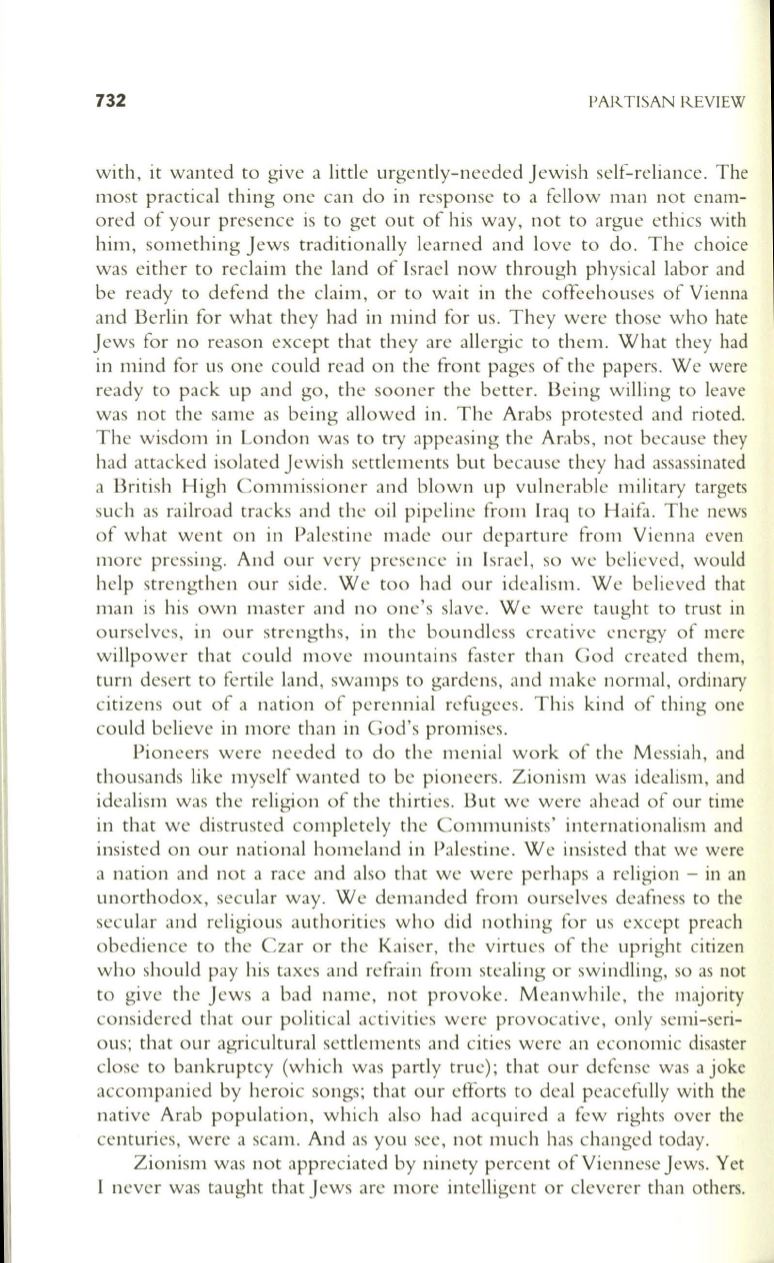
732
PARTISAN
r~£VIEW
with, it wanted to give a little urgently-needed Jewish self-reliance. The
most practical thing one can do in response to a fellow man not enam–
ored of your presence is to get out of his way, not to argue ethics with
him, something Jews traditionally learned and love to do. The choice
was either to reclaim the land of Israel now through physical labor and
be ready to defend the claim, or to wait in the coffeehouses of Vienna
and Berlin for what they had in mind for us. They were those who hate
Jews for no reason except that they are allergic to them. What they had
in mind for us one could read on the front pages of the papers. We were
ready to pack up and go, the sooner the better. Being willing to leave
was not the same as being allowed in. The Arabs protested and rioted.
The wisdom in London was to try appeasing the Arabs, not because they
had attacked isolated Jewish settlements but because they had assassinated
a British High Commissioner and blown up vulnerable military targets
such as railroad tracks and the oil pipeline from Iraq to Haifa. The news
of what went on in Palestine made our departure from Vienna even
more pressing. And our very presence in Israel, so we believed, would
help strengthen our side. We too had our idealism. We believed that
man is his own master and no one's slave. We were taught to trust in
ourselves, in our strengths, in the boundless creative energy of mere
willpower that could move mountains faster than God created them,
turn desert to fertile land, swamps to gardens, and make normal, ordinary
citizens out of a nation of perennial refugees. This kind of thing one
could believe in more than in God's promises.
Pioneers were needed to do the menial work of the Messiah, and
thousands like myself wanted to be pioneers. Zionism was idealism, and
idealism was the religion of the thirties. But we were ahead of our time
in that we distrusted completely the Communists' internationalism and
insisted on our national homeland in Palestine. We insisted that we were
a nation and not a race and also that we were perhaps a religion - in an
unorthodox, secular way. We demanded from ourselves deafness to the
secular and religious authorities who did nothing for us except preach
obedience to the Czar or the Kaiser, the virtues of the upright citizen
who should pay his taxes and refrain from stealing or swindling, so as not
to give the Jews a bad name, not provoke. Meanwhile, the majority
considered that our political activities were provocative, only semi-seri–
ous; that our agricultural settl ements and cities were an economic disaster
close to bankruptcy (which was partly true); that our defense was a joke
accompanied by heroic songs; that our efforts to deal peacefully with the
native Arab population, which also had acquired a few rights over the
centuries, were a scam. And as you see, not much has changed today.
Zionism was not appreciated by ninety percent of Viennese Jews. Yet
I never was taught that Jews are more intelligent or cleverer than others.


